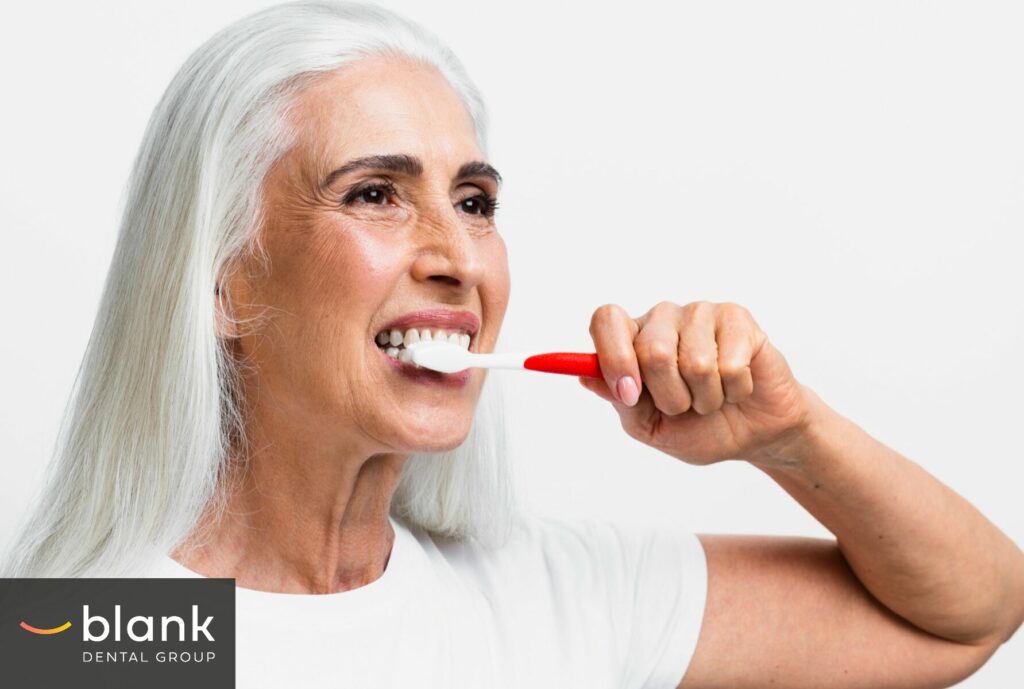If you’ve taken this step toward a healthier smile, you’ve made a significant investment in your oral health and quality of life. Here’s the good news: With proper care, your implants can last for decades—potentially even a lifetime. Just like your natural teeth, though, they need regular TLC to stay in great shape.

Daily Care Routines for Dental Implants
The foundation of implant maintenance starts right at home with your daily routine. You might be wondering if implants can get cavities like normal teeth. While the implants themselves can’t decay, the gums and bone around them still need protection from infection and inflammation that could threaten your implant’s stability.
Brushing Techniques
You’ll want to brush your implants twice daily, just like you would your natural teeth. But there are a few special considerations to keep in mind. Grab a soft-bristled toothbrush that won’t scratch your implant surface or irritate your gums. Many of our patients find electric toothbrushes with pressure sensors helpful since they prevent you from brushing too hard—something we all tend to do sometimes!
When you brush, try holding your toothbrush at a 45-degree angle to your gumline and use gentle circular motions. Don’t forget to reach all sides of the implant restoration, especially those tricky spots in the back or between teeth.
Remember, while your implant can’t get a cavity, plaque buildup around it can lead to something called peri-implantitis—think of it as the implant version of gum disease—which can cause bone loss and implant failure if ignored.
Flossing Around Implants
We can’t stress enough how important flossing is for implant health. Those food particles and bacteria that sneak between teeth and around implants can cause trouble if they’re allowed to hang around too long.
If you have a single implant, regular floss or interdental brushes work wonderfully. But for those of you with implant-supported bridges or more complex work, you might need some specialized tools. Don’t worry—we can recommend floss threaders, water flossers, or implant-specific brushes based on your particular situation during your next visit.
Specialized Products for Implant Care
You’ll find quite a few products on the market designed specifically for implant care. Look for non-abrasive or low-abrasive toothpastes rather than those highly abrasive whitening formulas that can scratch implant surfaces. Many patients benefit from antimicrobial mouth rinses to reduce bacteria around the implant site, and some find implant-specific floss with stiffened ends easier to maneuver around their new teeth.
Before trying any new product, though, we recommend checking with us first. Some ingredients might not be ideal for your specific situation, and we can help guide you toward what will work best for your mouth.

Regular Professional Maintenance
While your at-home routine is essential, those regular visits to our office play an equally important role in keeping your implants in tip-top shape.
The Importance of Regular Check-ups
These check-ups allow us to keep an eye on your implants and catch any potential issues before they become serious problems. Think of it as preventive maintenance—much like getting regular oil changes for your car rather than waiting for the engine to fail.
For most of our patients, especially those with dental implants in Springfield, Ohio, we recommend visits every six months, though some situations might call for more frequent check-ups. During these visits, we’ll carefully examine your implant restoration, check the health of your surrounding gum tissue, make sure your bite is properly aligned, and look at how the opposing teeth contact your implant.
We’ll also periodically take digital X-rays to check the bone levels around your implant and make sure everything looks stable below the gumline where you can’t see.
Professional Cleaning Benefits
The professional cleanings you’ll receive from our hygienists are vital for implant health. Even with the most diligent home care routine, some plaque and tartar inevitably build up over time. Our team uses specialized instruments designed specifically for implant surfaces—they won’t scratch or damage your investment like standard dental tools might.
We’ll clean thoroughly around the implant-gum margin, which is where harmful bacteria tend to accumulate. In some cases, we might also apply antimicrobial agents to further reduce bacterial presence around the implant and keep your gums healthy.
Warning Signs to Watch For
Being proactive about potential problems can save you a lot of trouble down the road. Early detection often means simpler, less invasive solutions.
If you notice bleeding or swelling around your implant when brushing or flossing, that’s your mouth trying to tell you something. The same goes for a receding gum line around the implant or unusual discoloration of the surrounding tissue. Discomfort when chewing, any movement or looseness of the implant restoration, and persistent bad breath despite good oral hygiene are all signs that warrant a call to our office.
These symptoms could indicate conditions like peri-implant mucositis (inflammation of the soft tissues) or the more serious peri-implantitis (inflammation affecting both soft tissues and supporting bone). Both need professional attention to prevent implant failure.
It’s worth noting that implant problems rarely hurt in their early stages—which is why those regular check-ups are so important. By the time pain develops, the condition has often progressed significantly, making treatment more complex.

Lifestyle Factors That Impact Implant Longevity
Your daily habits and overall health play a surprising role in how long your dental implants will last.
Dietary Considerations
While your implants are remarkably strong, they’re not indestructible. Try to be mindful about very hard foods like ice, hard candy, and nuts that could potentially damage ceramic crowns. Sticky foods can sometimes dislodge temporary restorations or put extra stress on permanent ones. And those highly acidic foods and beverages we all enjoy occasionally? They can accelerate wear on both natural teeth and implant restorations over time.
Focus on eating a balanced diet rich in calcium, vitamin D, and protein to help maintain the bone that supports your implants. Staying well-hydrated is also important—it promotes healthy saliva production, which helps neutralize acids and rinse away food particles throughout the day.
Habits to Avoid
There are a few habits that can significantly impact implant health and longevity. Smoking tops the list—it restricts blood flow to your gums, impairs healing, and can increase implant failure risk by up to 15%. If you smoke, quitting will dramatically improve your implant prognosis (not to mention your overall health).
Do you grind your teeth at night? This habit, called bruxism, places excessive force on implants and can damage both the implant components and the supporting bone. If you’re a grinder, we can create a custom night guard to protect your investment while you sleep.
And while it might be tempting to use your teeth as tools to open packages or bottles (we’ve all done it in a pinch), this can cause chips, cracks, or even catastrophic failures of implant restorations. Your implants are an investment worth protecting from these kinds of risks.
The Overall Health Connection
Your general health has a surprisingly strong connection to your implant success. Conditions like uncontrolled diabetes, certain autoimmune disorders, and osteoporosis can affect bone health and healing, potentially compromising implant stability.
Keeping up with your regular medical check-ups and managing any chronic health conditions will support not just your overall well-being but also the health of your dental implants.
Protecting Your Investment
With the right care, your dental implants can provide decades of comfortable function and natural-looking aesthetics. The key is a three-pronged approach: diligent daily home care, regular professional maintenance, and healthy lifestyle choices.
Remember that your dental implants represent a significant investment in your health and quality of life. The time and effort you dedicate to their maintenance is minimal compared to the benefits of having a secure, comfortable, and attractive smile for years to come.







